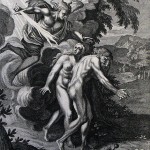There are two types of men, those who are afraid to lose God, and those who are afraid that they might find Him – Blaise Pascal
Faith is really all about love (and love, faith).
Let’s think about that for a moment. And I don’t mean – at least not directly – that loving someone requires a leap of faith since we can never really know what the future will hold.
Love surely encompasses that, true.
But what I mean to say is that our quest for romantic, earthly love is often akin to, or perhaps mirrors, our search for God and our journey towards faith. Love sort of gives us a brief peek into the heavenly realm, at least as much of it as our finite minds can reasonably comprehend.
If facts, observation, reasoning, and analysis – those things which we most often associate with scientific methodology – always perfectly informed our world, then likely each and every successful pairing on E-Harmony, Match, or OkCupid, could – and perhaps should – lead always, unerringly, and directly to love.
Because if love were to be reduced to some analytic formula or objective criteria – X, Y and Z, together, give us great joy and grace our lives with great meaning, and our computerized match is seeking those exact same pleasures – then, more often then not, we would fall in love with them, and they with us. There’d be no mystery involved, and nothing more outside of us that we’d need to examine.
Yet, we know that’s not how it works.
Not at all.
While relevant computer selection criteria may help us to discover simpatico mates, they cannot – in and of themselves – lead us to love.
For love isn’t a neat set of rules or formulas. And it’s certainly never reducible to some set of objective criteria. We understand that love is, at its heart, a great mystery.
A joyful, soulful, unexplainable, outside-of-ourselves, bigger-than-us-all, mystery.
Its explanation necessitates our entering into the world of the abstract. Something neither concrete nor material. Something – we sense deep down – not of this world (something sensed even by those who rely upon or seek nothing more than the things of this world).
So what does this have to do with faith, or the search for God?
Well, let’s first take one step back:
Thomas Aquinas famously proposed what he referred to as five proofs for the existence of God – briefly summarized here.
It’s Aquinas’ fourth proof, illustrated below, that I’ll now briefly focus on:
Aquinas notes that there is a certain gradation in all things. For instance we can group things that are hot according to varying degrees of the amount of heat perceptible in that object. In classifying objects there is always something which displays the maximum fullness of that characteristic. Thus universal qualities in man such as justice and goodness must attribute their varying qualities to God; the source of maximum and perfect justice and goodness.
You’ll observe that this proof is, at its core, merely a reasoned one and not a definitive one: Since X (here, the characteristic of heat) exists, and since X can vary in intensity (something can be either hot or less hot), there must exist something which is maximum X (that is, contains the greatest amount of heat).
So, analogizing: since goodness exists in this world, we can reason that God – who is Himself perfect goodness – must necessarily also exist.
But note that our ability to reason our way to God doesn’t preclude a substantial reliance upon faith in ultimately making the connection. Rather, much like what transpires when we fall in love, we can sense that there is something more here – something beyond reason. Something that, in fact, demands our faith.
In fact, whatever it is, it’s largely intuitive. To be colloquial about it, we must tap into our gut instinct.
In the video embedded below, Bishop-Elect Robert Barron refers to this faith leap as a scientific mystical intuition. That seemingly oxymoronic term perfectly sets and then defines the issue: God made the world intelligible, discoverable, and knowable, through observation, reason, and analysis. But we sense that there’s more happening here than simply observed facts and analytical reasoning. Something involving an intuitive knowing above and beyond what is readily being observed.
Something, perhaps, instilled within us by God Himself.
Thus the proof that Aquinas and Barron both ultimately point us to demands something greater than mere observable evidence:
Through the use of natural reason we can logically conclude in the existence of God. Yet strictly speaking, God’s existence cannot be definitively proven through laboratory tests and experimental science. Not all things are subject to experimental science. It is illogical to say, “If I can not see, taste, touch, feel or hear something it must not exist!” Reason and extrinsic evidence must also be considered. Experimental science and intrinsic evidence cannot definitively prove historical events, and yet by reason we know they have occurred. And surely [where] science falters and extrinsic evidence fail, reason and intrinsic evidence can prove the spiritual which can not be measured by material sciences.
So our search for God, and our journey towards faith, is much like our quest for love.
Both are largely and initially commenced through observation and reason.
But ultimately, both require us to, as Bishop-Elect Barron describes it, surrender into what we have observed and reasoned.
To fall in love. To leap into faith.
We react instinctively, involuntarily, incalculably.
But our dual quests for love and for God have not been rendered unscientific merely because they demand our faith.
Rather, it seems clear that faith itself serves to enhance, and even then complete, our search.
I’d even suggest that faith and love, together, serve as a cosmic bridge that will one day deliver us to the new heaven and the new earth, all yet to come.
So did you ever fall in love? Well, therein lies your faith.
Peace
Photo Image Credit: Wikimedia Commons, Public Domain (Jeremy Harbeck)













